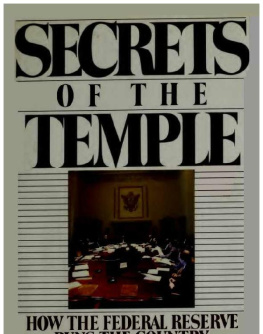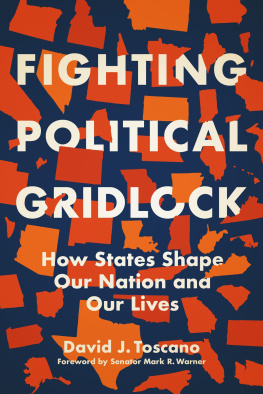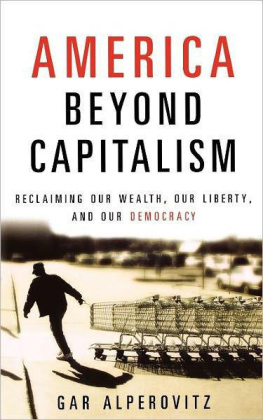WHO WILL TELL THE PEOPLE
The Betrayal of American Democracy
William Greider
Levavi & Levavi
SIMON & SCHUSTER PAPERBACKS
New York London Toronto Sydney
Praise for Who Will Tell the People:
One of those rare, essential books that should be not merely read but memorized.
New York Daily News
sets out to explain precisely how and why American democracy has washed up on the shoals of cynicism. The complaint may sound familiar, but such a brief prcis does not do justice to either the freshness of Greider's argument or the ambition of his approach.
TimeWho Will Tell the People
William Greider has given us the most subtle interpretation of contemporary American political culture yet to appear in print.
The Nation
The real question for Greider and for us is what we can do to reclaim democracy, to take it back from the wealthy special-interest groups that control the national agenda. Who Will Tell the People is a call to action. He makes a good argument that we'd better get busy if we are to make government work for us.
Houston Chronicle
Valuable Inspiring [Greider's] criticism is not only broad but deep.
The Washington Monthly
[An] eye-opening expose of how government has become a game for lobbyists, lawyers and influence brokers. Stirring.
Playboy
Greider knows Washington exceptionally well and is a fine guide to the pork-barreling and back-scratching that glue together the private welfare state.
New York Newsday
Impassioned account of what has gone wrong with our democracy [Greider] brings to his examination of the American political system an outsider's outrage and an insider's knowledge.
San Francisco Chronicle
Greider has mastered the knack of being sweeping and meticulous at the same time. Greider makes it clear that the citizens' corrosive suspicions about their institutions, their parties and their government are well founded.
The Washington Post
Also by William Greider
The Trouble with Money
Secrets of the Temple
The Education of David Stockman and Other Americans
SIMON & SCHUSTER PAPERBACKS
Rockefeller Center
1230 Avenue of the Americas
New York, New York 10020
www.SimonandSchuster.com
Copyright 1992 by William Greider
All rights reserved,
including the right of reproduction
in whole or in part in any form.
SIMON & SCHUSTER PAPERBACKS
and colophon are registered trademarks
of Simon & Schuster Inc.
For information about special discounts for bulk purchases,
please contact Simon & Schuster Special Sales: 1-800-456-6798
or business@simonandschuster.com.
Designed by Levavi & Levavi
Manufactured in the United States of America
13 15 17 19 20 18 16 14
Library of Congress Cataloging-in-Publication Data
Greider, William.
Who will tell the people: The betrayal of American democracy
/William Greider.
p. cm.
Includes bibliographical references and index.
1. Political participationUnited States.
2. DemocracyUnited States.
3. Representative government and representationUnited States.
4. Pressure groupsUnited States.
5. Political corruptionUnited States.
6. United StatesPolitics and government1989
I.Title.
JK.1764.G74 1992
323.0420973dc20 92-3514
CIP
For Cameron McClure Greider and Katharine Smith Greider,
with love and awe
eISBN 13: 978-1-4391-2874-9
ISBN 13: 978-0-6718-6740-9
Contents
PART ONE
REALITIES OF POWER
PART TWO
HOW MAY THE PEOPLE SPEAK TO POWER?
PART THREE
MEDIATING VOICES
PART FOUR
TRIUMPH AND LOSS
Introduction:
Mutual Contempt
The decayed condition of American democracy is difficult to grasp, not because the facts are secret, but because the facts are visible everywhere. Symptoms of distress are accumulating freely in the political system and citizens are demoralized by the lack of coherent remedies. Given the recurring, disturbing facts, a climate of stagnant doubt has enveloped contemporary politics, a generalized sense of disappointment that is too diffuse and intangible to be easily confronted. The things that Americans were taught and still wish to believe about self-governmentthe articles of civic faith we loosely call democracyno longer seem to fit the present reality.
This dissonance between fact and faith is so discomforting that many naturally turn away from the implications. The visible dysfunctions in politics are dismissed as a temporary aberration or explained away, cynically, as the way things always were. The reluctance and evasion are understandable: Some unwanted truths are too painful to face.
The blunt message of this book is that American democracy is in much deeper trouble than most people wish to acknowledge. Behind the reassuring facade, the regular election contests and so forth, the substantive meaning of self-government has been hollowed out. What exists behind the formal shell is a systemic breakdown of the shared civic values we call democracy.
Citizens are cut out of the politics surrounding the most important governing questions. The representative system has undergone a grotesque distortion of its original purpose. The connective tissues that in different ways once linked ordinary people to governingpolitical parties, the media, the secondary mediating institutionsno longer function reliably.
At the highest levels of government, the power to decide things has instead gravitated from the many to the few, just as ordinary citizens suspect. Instead of popular will, the government now responds more often to narrow webs of powerthe interests of major economic organizations and concentrated wealth and the influential elites surrounding them. These organizations and individuals manage to shape the largest outcomes to the extent anyone does, while they neutralize or deflect what ordinary people think and believe.
In place of a meaningful democracy, the political community has embraced a permissive culture of false appearances. Government responds to the public's desires with an artful dance of symbolic gestureshollow laws that are emptied of serious content in the private bargaining of Washington. Promises are made and never kept. Laws are enacted and never enforced. When ordinary people organize themselves to confront the deception, they find themselves too marginalized to make much difference.
Governing elites, not surprisingly, tend to their own self-interest but, even when their intentions are broadly public-spirited, the result is generally the same: The people are missing from the processes of self-government and government itself suffers from the loss. Disconnected from larger public purposes, people can neither contribute their thinking to the government's decisions nor take any real responsibility for them. Elite decision makers are unable to advance coherent governing agendas for the nation, however, since they are too isolated from common values and experiences to be persuasive. The result is an enervating sense of stalemate.
In sum, the mutual understanding between citizens and government necessary for genuine democracy is now deformed or neglected. While democracy's decline has consequences for everyone, certain sectors of the citizenry suffer from the loss of political representation more severely and personally than everyone else. In general, they are the people who already lack the advantages of higher education or social status. Their political influence cannot depend upon private wealth since they have little or none. The atrophied political system has left them even more vulnerable to domination by others.







